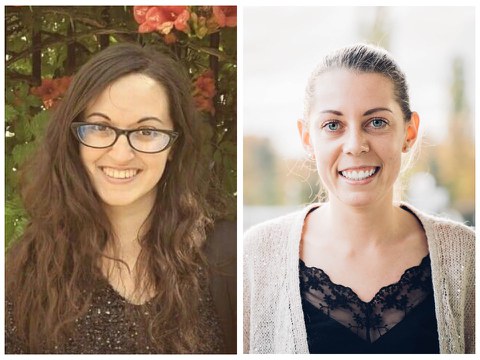Nov 23, 2020
Two CMCB graduates awarded with 2020 Georg-Helm prize

Dr. Lara Marrone (left) and Sarah Naomi Bolz (right)
TU Dresden has recently announced four winners of the 2020 Georg-Helm award. Two of them are Dr. Lara Marrone and Sarah Naomi Bolz - graduates from the Center for Molecular and Cellular Bioengineering (CMCB).
“I am pleased I was recognized for my efforts to work out the intricate processes underlying motor neuron disease,” says Dr. Lara Marrone who received the 2020 Georg-Helm award for her PhD thesis. Lara studied the molecular mechanisms leading to amyotrophic lateral sclerosis (ALS). “ALS is a devastating neurodegenerative disorder. The development of ALS has been linked to multiple mechanisms, making it challenging to find its primary cause,” explains Lara. She studied a protein called Fused in Sarcoma (FUS), which is mutated in a subgroup of ALS cases. She observed that mutations in FUS altered the behavior of this protein and other ALS-associated proteins as the result of a chain reaction. This highlighted a potential link between different subtypes of ALS that were previously considered to be independent of each other. As part of her thesis, she examined a collection of compounds for their ability to eliminate the misbehaving FUS protein. Lara found a class of drugs which were able to remedy the disease. “My work showed that enhancing the clearance of pathological proteins, such as FUS, could be a promising therapeutic strategy,” says Lara.
Lara completed her PhD work in the group of Dr. Jared Sterneckert at the Center for Regenerative Therapies Dresden (CRTD) at TU Dresden. “The CRTD and CMCB offered a vibrant and stimulating environment. Here, I acquired solid expertise, confidence, and scientific independence, which led me to continue my commitment to academic research in the field of motor neuron disorders. I am now at the Sheffield Institute for Translational Neuroscience (SITraN, UK), where I am engaged in developing gene therapeutic approaches for a neuromuscular disorder related to ALS.”
Another Georg-Helm prize went to Sarah Naomi Bolz for her Master’s thesis completed in Prof. Michael Schroeder group at the Biotechnology Center of the TU Dresden (BIOTEC). “I won’t lie if I say that my Master’s thesis was a life-changing experience. I decided to join a computational biology group without having previous computer science background. It was challenging but actually led me to discover a passion for bioinformatics. I see it as a perfect combination of biology, logic, and creativity. I decided to follow in this direction. After completing my Master’s thesis I started working on my PhD in computational biology,” says Sarah.
Sarah’s work focused on challenges connected to drug discovery. When testing for new therapeutic compounds scientists often record false positive hits, i.e., find compounds that appear as if they worked but upon closer examination do not. “Such compounds are called pan-assay interference compounds or just PAINS. The exact mechanisms of how PAINS are able to fool scientists are not known,” explains Sarah. She examined different collections of structural data and analyzed the interactions between PAINS and proteins. She characterized binding modes of PAINS-defining substructures and found that they can bind proteins in a variety of different ways. “My work let us know a little bit more about the mechanisms of promiscuous binding of PAINS and possibly other, similar compounds”, says Sarah.
"Congratulations to the winners! We are very proud of them and wish them continued success and a successful continuation of their scientific careers", says Prof. Stefan Diez, Managing Director of the CMCB.
The Georg Helm Prize was established in 1995 by the Verein zur Förderung von Studierenden der Technischen Universität Dresden e.V. The prize is awarded annually for outstanding doctoral, master's, and diploma theses. The winners receive a prize of 2,500 euros and a medal made of Meissen porcelain. Due to COVID-19-related restrictions, the 2020 award ceremony was postponed to 2021.
